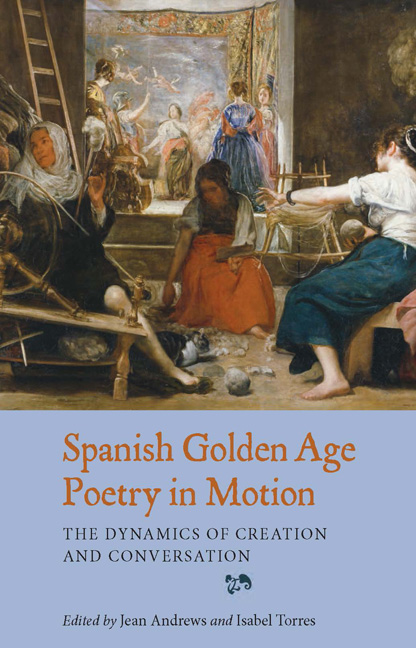Book contents
- Frontmatter
- Contents
- Contributors
- Acknowledgements
- Introduction
- 1 La poesía mutante del Siglo de Oro
- Part 1 Poetry in Creation
- 2 Moving in …Garcilaso de la Vega's ‘Dulces prendas por mi mal halladas’
- 3 The Movement of Thought and Feeling in the ‘Ode to Juan de Grial’
- 4 Metaphors of Movement in Two Poems of Fray Luis de León
- 5 El tiempo medido en versos: Camila Lucinda en las Rimas (1609) de Lope de Vega
- 6 Upwards to Helicon: Lope de Vega, the Laurel de Apolo, and Acts of Judgement
- 7 ‘Dulce es refugio’: El peregrino de Góngora se detiene
- 8 The Staging of Góngora's Three Funereal Sonnets for Margarita de Austria Estiria
- 9 Jealousy in María de Zayas's Intercalated Poetry: Lyric Illness and Narrative Cure
- 10 Hacia otra lectura del petrarquismo en Sor Juana Inés de la Cruz
- Part 2 Poetry in Conversation
- 11 El conde de Salinas y Leonor Pimentel: cuando se juntan el amor y la poesía
- 12 Poesía popular en movimiento: los jeroglíficos ‘muy propios al intento y muy de su profesión’ en las celebraciones de la Valencia barroca
- 13 Responding to Góngora: María Rosal and the Clori Poems
- 14 Traveling in Place: Baroque Lyric Transports in Translation, or Flames that Bridge the Stream
- Works Cited
- Index
2 - Moving in …Garcilaso de la Vega's ‘Dulces prendas por mi mal halladas’
Published online by Cambridge University Press: 05 November 2014
- Frontmatter
- Contents
- Contributors
- Acknowledgements
- Introduction
- 1 La poesía mutante del Siglo de Oro
- Part 1 Poetry in Creation
- 2 Moving in …Garcilaso de la Vega's ‘Dulces prendas por mi mal halladas’
- 3 The Movement of Thought and Feeling in the ‘Ode to Juan de Grial’
- 4 Metaphors of Movement in Two Poems of Fray Luis de León
- 5 El tiempo medido en versos: Camila Lucinda en las Rimas (1609) de Lope de Vega
- 6 Upwards to Helicon: Lope de Vega, the Laurel de Apolo, and Acts of Judgement
- 7 ‘Dulce es refugio’: El peregrino de Góngora se detiene
- 8 The Staging of Góngora's Three Funereal Sonnets for Margarita de Austria Estiria
- 9 Jealousy in María de Zayas's Intercalated Poetry: Lyric Illness and Narrative Cure
- 10 Hacia otra lectura del petrarquismo en Sor Juana Inés de la Cruz
- Part 2 Poetry in Conversation
- 11 El conde de Salinas y Leonor Pimentel: cuando se juntan el amor y la poesía
- 12 Poesía popular en movimiento: los jeroglíficos ‘muy propios al intento y muy de su profesión’ en las celebraciones de la Valencia barroca
- 13 Responding to Góngora: María Rosal and the Clori Poems
- 14 Traveling in Place: Baroque Lyric Transports in Translation, or Flames that Bridge the Stream
- Works Cited
- Index
Summary
A reader runs through it
If poetry plays to the most volatile and malleable part of our nature, then Plato, the philosopher, played poetry beautifully, and at its own game. The exploratory nature of Plato's writings, as well as their apparent inconsistencies, are well documented. His contradictory attitude, for instance, to poetry's relationship to the polity has not only dogged disciplinary discourse in terms of a centuries-long quarrel between philosophy and literature, but has also given rise to a provocative paradigm that connects order within the self to the construction of a utopian state. Individual selfhood is symbolically politicised in this process, while the construction of the social state risks deconstruction at the level of the resisting individual, the citizen who refuses to recognise reason as dominant in the ‘city’ within. But if, in the Republic, the rule of reason demands the expulsion of poets from a commonwealth of rationally self-determined citizens, how do we reconcile this attitude with the apotheosis of poetic madness (among other divinely-gifted madnesses) in the Phaedrus, a stance that taken even at its most ironic seems to revel in reason's dethronement? The answer is very simple – we cannot, and any attempt to extract an overarching philosophical system that suppresses the more aesthetic dimensions of Platonic discourse will be inevitably flawed. Plato's allusive self-consciousness is a hallmark of his writing. He may ban imitative poetry that flaunts deceptive appearance over reality, but he never tires of citing the poets himself throughout works where circumstances of context determine procedure.
- Type
- Chapter
- Information
- Spanish Golden Age Poetry in MotionThe Dynamics of Creation and Conversation, pp. 41 - 58Publisher: Boydell & BrewerPrint publication year: 2014



